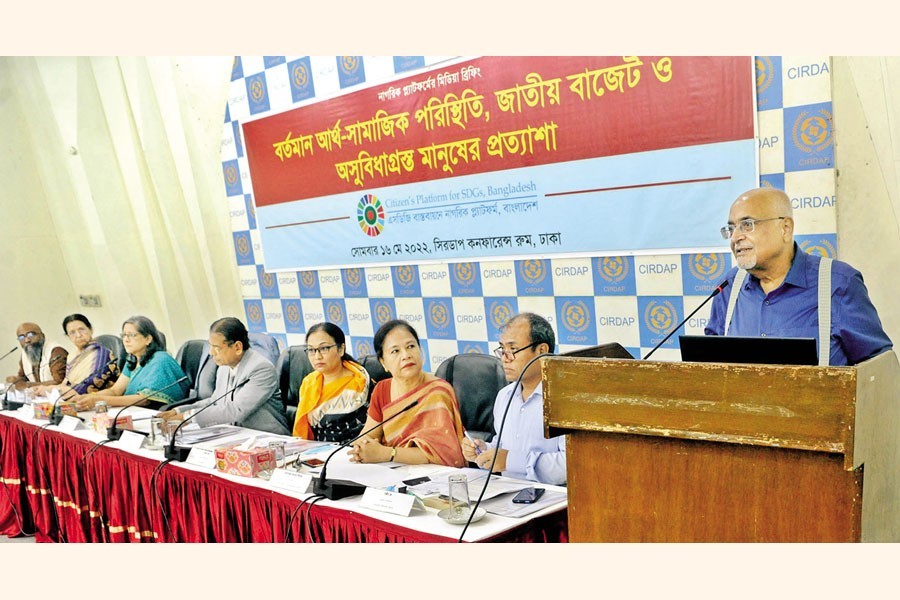The Citizen's Platform for SDGs, Bangladesh said on Monday that the country's inflation rate could be much higher than the official figure of 6.22 per cent until March this year as the official data are not always dependable.
It also anticipated that the inflation would increase further in the near future due to price hike of goods and essential commodities in the international market.
"It is not impossible that the inflation rate could be 12 per cent and the rate will increase in the future," said Dr Debapriya Bhattacharya, Convenor of Citizen's Platform for SDGs and also a distinguished fellow of Centre for Policy Dialogue (CPD), while presenting a paper on the current economic situation at a media briefing.
Dr Debapriya said the information about inflation the government is providing is neither realistic nor scientific.
He said the Bangladesh Bureau of Statistics (BBS) calculates Consumer Price Index (CPI) and inflation rate on the basis of base year 2005-06. Therefore, the real inflation situation is not coming out.
"In reality, the inflation rate is much higher as the BBS data fails to capture actual price level and consumer basket," he said.
Dr Debapriya said food inflation has been the driver behind recent inflationary pressure, both in national and disaggregate level (rural and urban).
"Prices of palm oil, wheat flour and lentil prices are higher in Bangladesh, compared to most regions of India," he said.
According to BBS, the national inflation in March 2022 was 6.22 per cent, while rural inflation was 6.52 per cent and urban inflation was 5.69. The food inflation was 6.34 per cent and no-food inflation 6.04 per cent.
The SDG platform organised the media briefing to disseminate findings of a study titled 'Current Socio-Economic Condition, National Budget and Perspectives of the 'Left Behind' Communities' at CIRDAP hall in the city.
The study paper observed that the absence of macro-economic stability affects the income of the poor most, especially when price rise destabilises the macro-economic stability.
"So, the government's first priority should be maintaining macroeconomic stability in the fiscal budget for 2022-23," it said.
According to the paper findings, depositors are losing real value of their money as deposit rate falls amid rising inflation rate.
"Given other macro correlates, Bangladesh Bank may have to relax the interest rates soon," it said.
The platform has urged the government to bring at least 10 per cent (around 6,69,000 people) of the country's unemployed youths under the government's safety-net initiative.
It also proposed fixing all types of social safety allowances at a minimum of Tk 1,000 to help the marginalised cope with the rising prices of essential commodities.
The platform calculated that the government will have to allocate some Tk 58.63 billion (1.34 per cent of the GDP) more in FY 2022-23 budget to ensure the minimum of Tk 1,000 allowance for the financially insolvent.
Observing that macroeconomic stability in Bangladesh has never been so much under pressure since 2007-08, it said the tax-free income limit at an individual level should be at Tk 3,50,000 while women and other disadvantaged groups may be given further leeway.
The SDG Platform said that Bangladesh's economy is yet to get back to its pre-pandemic level while the Russia-Ukraine War, supply chain dislocation, and rising commodity prices, among other factors, are to make the situation worse in the future.
According to the findings, Bangladesh's total Revenue-to-GDP ratio was at 9.4 per cent in FY21 - a figure lowest among all South Asian nations and one of the lowest in the world.
The recommendations and observations made in SDG Platform's latest study include: employment targeting and employment tracking, more food support and fiscal assistance, increased allocations to address pandemic fallouts, allocating a certain portion of local government budgets for children, supporting to non-MPO school teachers, introduction of an Education Credit Card for students with a yearly limit of Tk1,00,000, additional and specific allocation for the education of minority groups, better access to bank loans for LGBTQ+ communities, more human capacity for agricultural extension services, more effective pricing and processes for paddy and rice procurement, fixing prices by the government for fertilizer and hybrid seeds, and introduction of health cards for the workers.
Distinguished CPD fellow Dr Mustafizur Rahman, Country Director of Action Aid Farah Kabir, Professor Rumana Haque and BUILD CEO Ferdous Ara were present at the media briefing.


